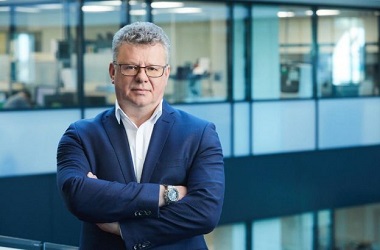 With the rapid growth of research potential in various fields, the need for modern tools and convenient infrastructure inevitably grows. In order to meet this need, it is planned to expand the largest and most modern research base in Lithuania in Saulėtekis - by investing in modern Faculties of Chemistry and Geosciences and Mathematics and Informatics of Vilnius University (VU), the largest nucleus of life, physical and technological sciences would form here.
With the rapid growth of research potential in various fields, the need for modern tools and convenient infrastructure inevitably grows. In order to meet this need, it is planned to expand the largest and most modern research base in Lithuania in Saulėtekis - by investing in modern Faculties of Chemistry and Geosciences and Mathematics and Informatics of Vilnius University (VU), the largest nucleus of life, physical and technological sciences would form here.
Algimantas Markauskas, a scientist, biochemist and CEO of Thermo Fisher Scientific Baltics, is also convinced of the need and importance of this investment. According to him, the right infrastructure and concentration of science in various fields in one place will not only motivate researchers, create better conditions for cooperation between science and business, but also will create opportunities for research of global significance.
Appropriate infrastructure - new opportunities and motivation
A. Markauskas claims that investment in science and knowledge and investment in infrastructure are directly related processes that are equally important in achieving strategic goals relevant to the whole of Lithuania, i.e. a closer cooperation between science, studies and business.
“I am surprised by the statement that in the case of the Faculties of Chemistry or Mathematics, it is not necessary to invest in bricks, but only in knowledge. In my opinion, knowledge is content and first of all, you need to have a container to put that content in. Anyone involved in chemical science has probably visited the VU Faculty of Chemistry and knows that it is an extremely old building that can hardly attract young people to study there. This is just one of the examples that draw attention to the impact of bricks and buildings,” says the biochemist.
According to the CEO of Thermo Fisher Scientific Baltics, the VU Life Sciences Centre (LSC) is the best example of how the right infrastructure is crucial for creating a motivating and competitive environment and achieving the goals of international cooperation. According to Mr. Markauskas, it was the modern LSC of VU that determined the decision of EMBL (European Molecular Biotechnology Laboratory) to establish as many as six scientific groups in Vilnius.
“Neither in the former building of the Institute of Biotechnology nor in the Faculty of Chemistry would they have been established, and the general change before and after the establishment of LSC can be compared not by hearsay - students’ motivation differs as day and night. Therefore, it is obvious that it is not investing in bricks only - if we want to motivate young, talented people not to go to study abroad, but to stay in Lithuania, we must create conditions for that. In my mind, this project is not gaining the right momentum for too long,” Mr. Markauskas says.
Interdisciplinarity in science centres leads to the greatest achievements
A. Markauskas believes that observing the perspectives in the field of science, interdisciplinarity between various fields of science has been a clear priority for more than a decade, because this is where the biggest breakthroughs take place. “For example, without chemistry, there are no fields for application of biotechnology, physics and new lasers, and there is no nanotechnology or food industry. Therefore, the mere inclusion of chemistry in that nucleus of science ensures closer interdisciplinary links and is a top priority.”
According to the head of Thermo Fisher Scientific Baltics, businesses often look for scientists from various disciplines themselves and team them up to carry out various projects. Therefore, a single joint centre and pool of researchers would not only stimulate and simplify the processes of scientific and business cooperation, but also contribute to a smoother interaction between different disciplines.
“It is also important to include the science of mathematics, which has been thought to be ahead for hundreds of years and to have far surpassed all others. With the transition of biology to digital format, with the advent of vast amounts of genetic information, it has become clear that mathematicians have room to develop further in order to process that information properly. Therefore, it is obvious that we need to create a modern joint infrastructure, which we could fill with knowledge, because bad conditions will not guarantee results of global significance,” says Algimantas Markauskas.
According to the biochemist, potential and highly applicable research areas in the business, such as lasers in physics, biotechnology, show good results in the international market due to well-organized focus and broad vision, strategically developed visions.
“When we look at the neighbouring countries, i.e. Latvia, Estonia, Poland, none of them has a company like Thermo Fisher Scientific. Although there are many reasons for this, one of the most important is that we have been able to mobilize a critical mass of competent scientists and knowledge in biotechnology in Lithuania, which have become such a combination. Professors, who saw the prospects for future top-level research in the deep Soviet era, made a significant contribution to this,” says the head of the company.
Accumulated experience and knowledge lead forward
When it comes to the relationship between science and business, investment in science is often misunderstood as a necessary guarantee of success, with a financial return in a short period of several years, and if this goal is not achieved, the accumulated knowledge is considered worthless. According to A. Markauskas, not only knowledge but also competencies acquired by people should be considered a value.
“A half-year project that has not earned a million is an investment in a person who, having accumulated new knowledge, will apply it in another project and earn that million and more. In addition, it is important to understand that there are also unsuccessful projects – sometimes ideas simply do not come true. In science, a negative result is also a result that has value - how else to know that there is no need to choose that path or that the idea does not make sense. Just as bankruptcy in business – it is not a tragedy, it is a lesson learned, after which it is possible to start again with new energy,” says Mr. Markauskas.
A. Markauskas names long-term and permanent projects of Thermo Fisher Scientific Baltics and VU LSC as an example of successful cooperation. One of them is the Mobile Bio class, when VU students and company specialists visit regional Lithuanian schools and allow students to perform scientific experiments with real scientific equipment. In addition, Thermo Fisher Scientific Science Days are held annually at VU LSC and are usually attended by an exhibition of the latest scientific equipment.
“During these events, a very wide cycle of scientific reports on the latest technological platforms and products is organised. It is a synergy, when we get a place and an audience from VU, and we organise a scientific conference, which allows bringing together scientists from all over Lithuania.
In addition, we have established special scholarships, we provide about 30-40 VU students with the opportunity to complete their final theses in our laboratories, where they use the most modern equipment, the necessary reagents, have very professional supervisors, so the performed work becomes very relevant and necessary,” says A. Markauskas.
Thermo Fisher Scientific also contributes to the activities of the VU student team, which has won the largest international competition in synthetic biology contest iGEM. This year, for the second time, this team has won the award for the absolute best team, bearing in mind that teams from almost 240 universities around the world participate in the competition. The company provides the team with the necessary reagents for experiments, produced in Vilnius, and helps to implement other team projects for public education.
“I am overwhelmed with this year’s winning as well, this is the highest achievement, our students are overtaking universities like Harvard, Oxford and others. And again, they are successful because they have excellent mentors – Prof Rolandas Meškys, Prof Virginijus Šikšnys, they receive the necessary financial support, and finally - the necessary competencies and motivation from previous achievements. And when there are all these components - everything is possible even in such a small country as Lithuania,” claims Mr. Markauskas.
